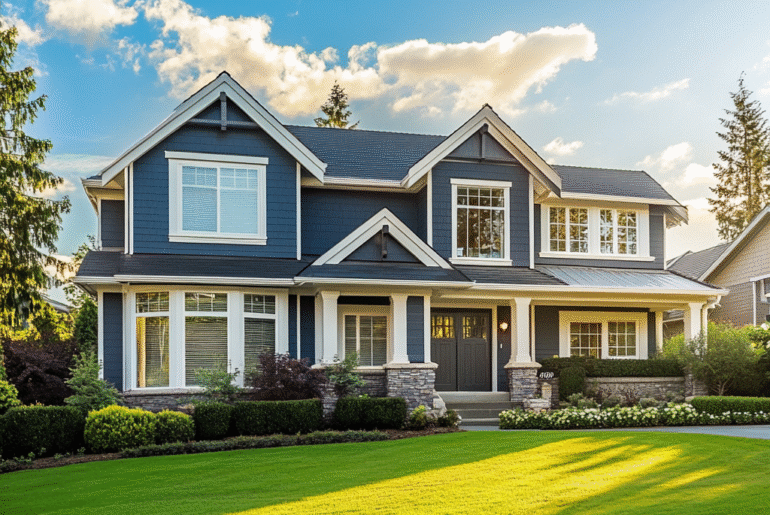This article may contain references to products or services from one or more of our advertisers or partners. We may receive compensation when you click on links to those products or services. Nonetheless, our opinions are our own.
The information presented in this article is accurate to the best of our knowledge at the time of publication. However, information is subject to change, and no guarantees are made about the continued accuracy or completeness of this content after its publication date.
Purchasing a new home is among the most thrilling things you can do in life. However, it’s easy to get caught up in the excitement and forget about important things that will impact your comfort and budget in the long run. The utilities behind the walls can affect your daily life as much as the number of bedrooms, the kitchen layout, and the neighborhood’s charm. Asking the right utility-related questions can help you avoid unexpected costs and make your home more efficient and environmentally friendly. We’ll show you the basic utilities that every homebuyer should look into before buying a home.
- Your Future Utility Costs
- The Importance of Assessing Local Utility Providers
- How to Gauge the Efficiency of Your Home’s Systems
- Identifying Hidden Utility Challenges in Your New Neighborhood
- Evaluating Eco-Friendly Options That Save You Money
- Tips for Budgeting Utility Expenses in Your Home Purchase
- Conclusion
- Frequently Asked Questions
- What is the average utility cost for the area I’m considering?
- How is the local water supply managed?
- Are there any upcoming utility rate increases?
- What are the utilities like in the winter and summer months?
- What is the condition of the home’s wiring and plumbing?
- Are there energy-efficient upgrades that I should consider?
- How do the utilities in this area compare with other neighborhoods?
- What is the history of outages in the area?
- Is the home part of any utility districts or special assessments?
- Are there any local incentives for energy conservation or renewable energy?
- Recommended Reads
Your Future Utility Costs
When trying to figure out how much your utility bills will be in the future, it’s important to look at the little things that could have a big effect on your budget. Start by asking useful questions about how energy-efficient the house is. The age of your HVAC system, the quality of your insulation, and the way your windows are made all affect how much you pay each month. It’s also important to research local utility providers and whether you have options for energy, water, internet, or waste removal services. This can give you flexibility and potentially lower costs.
Factors to Consider
- Average monthly costs for electricity, gas, water, and trash collection
- Age and condition of HVAC, insulation, and windows
- Access to renewable energy programs or rebates
- Historical utility bill data from previous homeowners
Seasonal Utility Cost Table
| Utility Type | Winter Average | Summer Average |
|---|---|---|
| Electricity | $120 | $150 |
| Gas | $200 | $80 |
| Water | $50 | $60 |
By reviewing these details, you prepare for real-world costs and can plan future upgrades to boost efficiency and reduce waste.
The Importance of Assessing Local Utility Providers
If you only think about location, layout, and curb appeal, you might forget about the role of local utility companies. But these groups can have a big impact on how much you spend and how happy you are as a homeowner. Not all providers are the same; differences in price, dependability, and customer service can have long-term effects. If you do your research ahead of time, you can pick a home that is serviced by reliable companies with clear billing and eco-friendly options.
Questions to Ask
- Are there multiple providers in the area?
- Are there hidden fees in billing structures?
- How reliable is the service during storms or high demand?
- Are renewable energy options available?
Provider Comparison Table
| Utility Type | Provider Options | Notes |
|---|---|---|
| Electricity | Local Co-op, National Company | Compare rates and available incentives |
| Water | City Utility, Private Company | Review water quality and the billing system |
| Gas | Regional Supplier | Watch for seasonal price fluctuations |
Identifying strong providers in advance ensures a smoother and more affordable transition to homeownership.
How to Gauge the Efficiency of Your Home’s Systems
How well a home runs isn’t always clear from the outside. Check out the home’s main systems to make sure they won’t cause high energy bills or need many repairs. Check for ENERGY STAR labels on appliances and ask for old utility bills to see how much energy you use at different times of the year.
What to Evaluate
- Installation year of HVAC and major systems
- Condition of attic and wall insulation
- Type of windows and doors (double-pane, energy-rated, etc.)
- Maintenance records for appliances
Efficiency Table for Systems
| System | Average Lifespan | Signs of Inefficiency |
|---|---|---|
| HVAC | 15–20 years | Uneven temperatures, frequent repairs |
| Water Heater | 10–15 years | Murky water, odd noises |
| Refrigerator | 10–20 years | Inconsistent cooling, high moisture |
Knowing what may need upgrading can help you negotiate a better deal or plan post-purchase improvements.
Voted "Best Overall Budgeting App" by Forbes and WSJ
Monarch Money helps you budget, track spending, set goals, and plan your financial future—all in one app.
Get 50% OFF your first year with code MONARCHVIP
The beauty of a neighborhood can make you forget about possible utility problems. Before you move in, find out how utility services work in the area and if residents have any common problems.
Important Research Areas
- Can you choose between utility providers?
- What are the typical utility rates for nearby homes?
- Are outages frequent or service disruptions common?
Gather Feedback from Residents
Join local community groups or forums to get unfiltered feedback about:
- Power or water service reliability
- Internet speed and uptime
- Sewer and drainage costs or issues
Evaluating Eco-Friendly Options That Save You Money
Eco-friendly home features can offer long-term cost savings and environmental benefits. As energy prices rise, these sustainable solutions are increasingly worth considering.
Cost-Saving Eco Upgrades
- Energy-Efficient Appliances: Certified appliances consume less energy and reduce operating costs.
- Insulation and Windows: Proper insulation and sealed windows lower heating/cooling demands.
- Solar Panels: The initial cost is high, but incentives and energy savings can justify the investment.
- Water-Saving Fixtures: Low-flow fixtures cut down on usage without reducing comfort.
Eco Upgrade ROI Table
| Option | Initial Investment ($) | Estimated Annual Savings ($) |
|---|---|---|
| Energy-Efficient Appliances | 2,000 | 300 |
| Insulation/Windows | 5,000 | 800 |
| Solar Panels | 15,000 | 1,500 |
| Water-Saving Fixtures | 500 | 150 |
Small investments today can reduce monthly bills for years to come.
Tips for Budgeting Utility Expenses in Your Home Purchase
Utility costs are rarely included in home listings, but they can significantly impact your monthly financial plan. Preparing for them ahead of time helps prevent unpleasant surprises.
Smart Budgeting Tips
- Research Utility Costs: Use local forums or cost-of-living databases to estimate expenses.
- Inspect for Efficiency: Have a home energy audit conducted if possible.
- Account for Seasonal Shifts: Costs vary dramatically between winter and summer.
Monthly Utility Budget Sample
| Utility Type | Monthly Estimate |
|---|---|
| Electricity | $100 |
| Gas | $75 |
| Water & Sewer | $50 |
| Trash Collection | $30 |
| Internet & Cable | $80 |
Building a utility buffer into your budget ensures long-term affordability and stability.
Conclusion
It’s not just about the location and how it looks when you buy a house; you also need to know how much it will cost to own, including utilities. You can make better decisions by actively looking into energy efficiency, researching local providers, and planning for your monthly costs. If you fail to monitor your utility bills, they can gradually deplete your finances. But asking the right questions now will give you peace of mind and financial security later. To turn a wonderful property into a truly livable, efficient, and affordable home, make utility research a big part of your home-buying process.
Frequently Asked Questions
What is the average utility cost for the area I’m considering?
Costs vary by region and home characteristics. Consult residents or utility providers for an accurate estimate based on square footage, climate, and energy efficiency.
How is the local water supply managed?
Ask whether the home uses municipal water or a well system. Review water quality reports and inquire about any boil advisories or billing concerns in the area.
Are there any upcoming utility rate increases?
Contact local providers or city hall to find out if rate hikes are scheduled. This can affect your affordability shortly after moving in.
What are the utilities like in the winter and summer months?
Expect higher heating bills in winter and cooling expenses in summer. Reviewing prior utility bills or speaking with neighbors can help you gauge seasonal shifts.
What is the condition of the home’s wiring and plumbing?
Old systems can lead to inefficiencies, safety concerns, and surprise repairs. Always request a thorough inspection before finalizing a purchase.
Are there energy-efficient upgrades that I should consider?
Upgrades like smart thermostats, newer HVAC systems, and insulated windows can drastically reduce costs. Look for past renovations or plan for future improvements.
How do the utilities in this area compare with other neighborhoods?
Some neighborhoods have more reliable service or better rates. Comparing areas can reveal savings potential and quality-of-life differences.
What is the history of outages in the area?
Frequent power or internet disruptions can disrupt work and comfort. Ask current residents or check local news archives for utility performance data.
Is the home part of any utility districts or special assessments?
Some properties include utility district fees or assessments in their tax bill. These hidden costs can add hundreds of dollars annually.
Are there any local incentives for energy conservation or renewable energy?
Check with your local government or utility providers for rebate programs, solar credits, or tax incentives for green upgrades.

Reviewed and edited by Albert Fang.
See a typo or want to suggest an edit/revision to the content? Use the contact us form to provide feedback.
At FangWallet, we value editorial integrity and open collaboration in curating quality content for readers to enjoy. Much appreciated for the assist.
Did you like our article and find it insightful? We encourage sharing the article link with family and friends to benefit as well - better yet, sharing on social media. Thank you for the support! 🍉
Article Title: Utilities Questions to Ask Before Buying a Home
https://fangwallet.com/2025/06/19/home-buying-utilities/The FangWallet Promise
FangWallet is an editorially independent resource - founded on breaking down challenging financial concepts for anyone to understand since 2014. While we adhere to editorial integrity, note that this post may contain references to products from our partners.
The FangWallet promise is always to have your best interest in mind and be transparent and honest about the financial picture.
Become an Insider

Subscribe to get a free daily budget planner printable to help get your money on track!
Make passive money the right way. No spam.
Editorial Disclaimer: The editorial content on this page is not provided by any of the companies mentioned. The opinions expressed here are the author's alone.
The content of this website is for informational purposes only and does not represent investment advice, or an offer or solicitation to buy or sell any security, investment, or product. Investors are encouraged to do their own due diligence, and, if necessary, consult professional advising before making any investment decisions. Investing involves a high degree of risk, and financial losses may occur including the potential loss of principal.
Source Citation References:
+ Inspo
There are no additional citations or references to note for this article at this time.












































